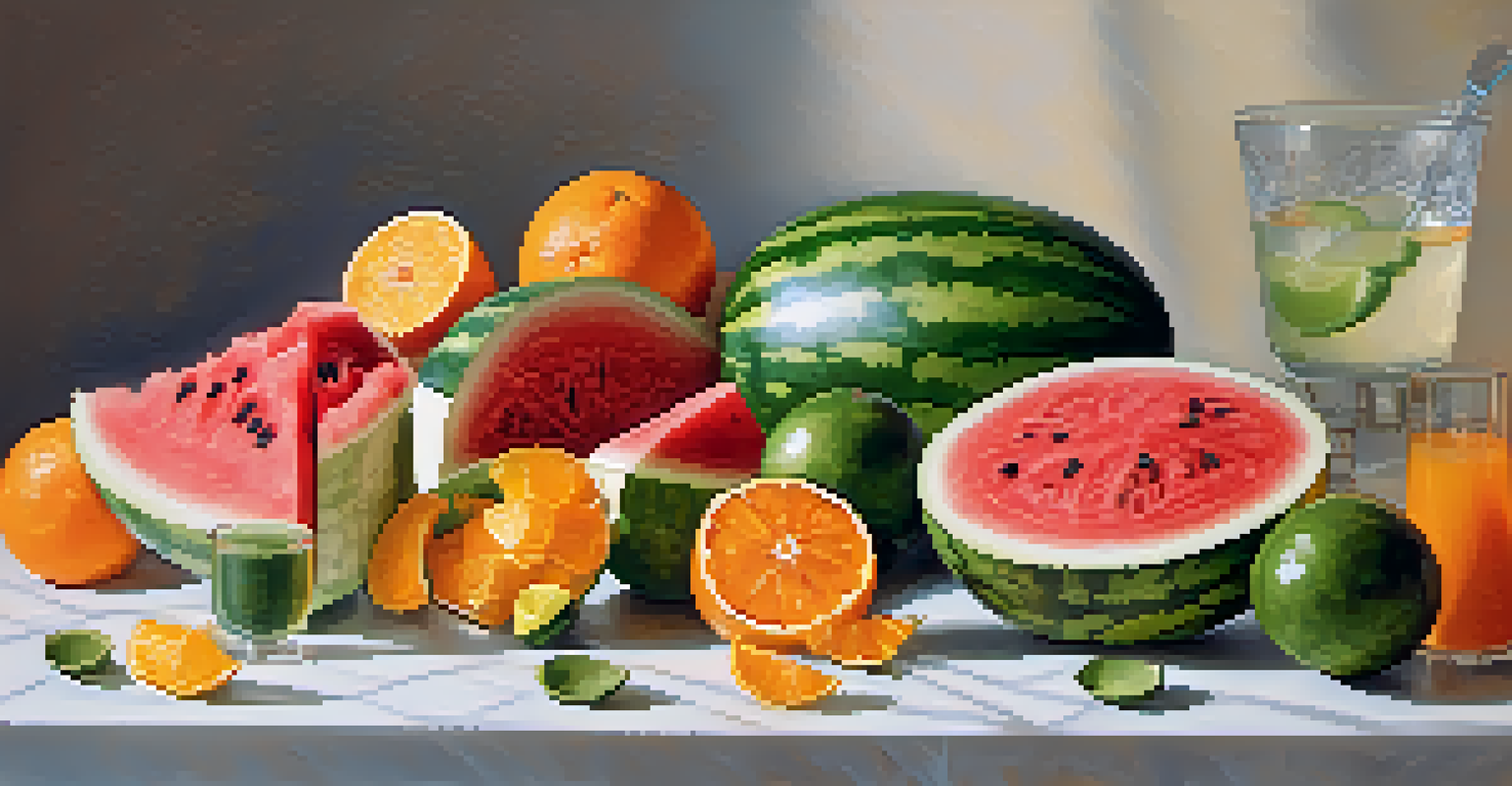The Importance of Hydration in Naturopathic Eye Care

Understanding the Basics of Hydration and Eye Health
Hydration is essential for overall health, but it plays a crucial role in eye wellness as well. Our eyes are composed of about 70% water, which means staying hydrated directly affects their function. When we don't drink enough water, our eyes can become dry and irritated, leading to discomfort and potential vision issues.
Water is the driving force of all nature.
In naturopathic eye care, hydration is viewed as a foundational element. Just as plants need water to thrive, our eyes require adequate moisture to maintain clarity and comfort. This connection highlights the importance of proper fluid intake as part of a holistic approach to eye health.
Moreover, hydration helps the body to produce tears, which are vital for lubricating the eyes. Without sufficient tears, we risk developing dry eye syndrome, which can cause redness, burning sensations, and even vision problems. Thus, understanding hydration's role is the first step towards better eye care.
How Dehydration Affects Your Eyes
Dehydration can have a noticeable impact on your eye health. When your body is low on fluids, it prioritizes hydration for vital organs, leaving your eyes less nourished. This can lead to a variety of uncomfortable symptoms, including dryness, irritation, and blurred vision.

Additionally, dehydration can exacerbate existing eye conditions. For instance, if someone suffers from allergies or certain types of eye diseases, inadequate hydration can worsen symptoms and recovery. This makes it essential to maintain consistent fluid intake, especially for those with pre-existing conditions.
Hydration is Key for Eye Health
Staying hydrated is essential for maintaining eye moisture and preventing discomfort or vision issues.
In more severe cases, chronic dehydration may even contribute to long-term damage to the cornea and other eye tissues. This emphasizes the importance of recognizing the signs of dehydration early and taking proactive measures to ensure your eyes receive the moisture they need.
The Connection Between Diet and Eye Hydration
What we eat significantly influences our hydration levels and, by extension, our eye health. Foods with high water content, such as cucumbers, watermelon, and oranges, can complement your fluid intake. These hydrating foods not only help maintain moisture in the body but also provide essential nutrients beneficial for eye health.
The eye is the jewel of the body.
Moreover, certain nutrients play a critical role in supporting eye hydration. Omega-3 fatty acids, found in fish and flaxseeds, are known to promote tear production and reduce dry eye symptoms. Incorporating such foods into your diet can enhance your hydration efforts while also nourishing your eyes.
Balancing hydration through diet is a natural and effective strategy in naturopathic care. Instead of solely relying on water, you can create a holistic approach by including hydrating foods and nutrients that support eye function, making your meals both delicious and beneficial.
Hydration Tips for Eye Care in Daily Life
Incorporating hydration into your daily routine can be simple and enjoyable. Start by carrying a reusable water bottle to remind yourself to drink water throughout the day. Setting specific times to take sips can help make hydration a habitual part of your life.
Another effective tip is to combine hydration with activities you enjoy. For example, you could sip herbal teas while reading or enjoy a refreshing smoothie after a workout. By linking hydration with pleasurable activities, you'll be more likely to maintain your fluid intake.
Diet Affects Eye Hydration Levels
Foods with high water content and specific nutrients, like omega-3 fatty acids, can enhance hydration and support eye wellness.
Lastly, consider monitoring your hydration levels. Simple indicators like urine color can help you gauge if you're drinking enough fluids. A light yellow color usually signifies good hydration, while darker shades can indicate a need for more water.
The Role of Supplements in Eye Hydration
While water is the best source of hydration, certain supplements can also play a role in supporting eye health. For example, omega-3 supplements can help improve tear production, particularly for those who struggle with dry eyes. These can be a great addition to your routine, especially if your diet lacks sufficient sources.
Additionally, some herbal supplements like bilberry are known for their eye health benefits. They can enhance circulation and provide antioxidants that protect eye tissues. When considering supplements, it's always wise to consult a healthcare provider to ensure they align with your overall wellness strategy.
Remember, supplements should complement, not replace, a good hydration practice. They can enhance your eye care regimen but should be used alongside proper fluid intake and a nutrient-rich diet for the best results.
Recognizing Signs of Dehydration in Eye Health
Being aware of dehydration signs can help you take corrective action early. If you notice your eyes feeling gritty, scratchy, or unusually sensitive to light, these could be indicators of dehydration. Paying attention to these signals can help you address hydration needs before they escalate into more serious issues.
Other symptoms include persistent redness and difficulty wearing contact lenses comfortably. If you experience these problems regularly, it might be time to evaluate your hydration habits. Keeping a journal of your symptoms and hydration levels can help you identify patterns and make necessary adjustments.
Recognize Dehydration Symptoms Early
Being aware of signs like dry, gritty eyes can help you address hydration needs before they lead to more serious problems.
Taking proactive steps when you notice these signs can greatly improve your eye comfort. Simple changes, like increasing your water intake or incorporating more hydrating foods, can make a significant difference in how your eyes feel.
Integrating Hydration into Naturopathic Eye Care
Hydration is a vital component of naturopathic eye care, emphasizing a holistic approach to health. By integrating hydration into your overall wellness plan, you can enhance your eye health naturally. This means not only drinking sufficient water but also focusing on a balanced diet and recognizing the body's signals.
Regular check-ins with a naturopathic practitioner can help tailor hydration strategies to your specific needs. They can provide personalized advice on hydration levels, dietary adjustments, and supplement recommendations that align with your eye care goals. This partnership can empower you to take charge of your eye health effectively.

Ultimately, prioritizing hydration in your daily routine can lead to brighter, healthier eyes. By understanding its importance and making conscious choices, you're nurturing not just your eyes, but your overall well-being.